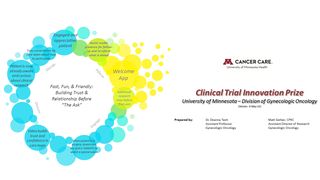Patients often do not participate in research because they equate participation in clinical research with being a “guinea pig” where potentially life-saving treatment will be withheld for the purpose of expanding scientific knowledge. Patients and their caregivers do not understand the what/how/why of research before they are asked to participate. We treat many diseases for which the current treatments do not provide a cure, and we know that the key to providing the best care for our patients is staying on the forefront of research. There is also a misconception that participating in a study may result in the withholding of a treatment which is known to be effective.
It is possible that patients and their loved ones are simply uninterested in watching a video, or intimidated by the technology. In this case, we can offer to send them a link to their phone or email which would allow them to watch it at their convenience. It is also possible that our initial message is not effective. To improve our message, we will request feedback from a random sampling of patients, and upgrade the App and the videos as indicated by our patients and their families.
We expect a > 50% increase in research participation. This is based on our recruitment goals in Gynecologic Oncology, and large participation in social media by our patients, as evidenced by Twitter feeds from our local cancer advocacy organization. We will look at data on the proportion of new patients who participated in research within a year of their initial visit and compare to one year of using our video tool. As soon as video is live we can start evaluating the impact, and revise to improve its message over time. We expect to see a quick increase in participation.
If this initiative is found to be effective, we will implement it for all of our new patients. We will continuously update the videos as new studies open, or as applicable for phase I, II, and III studies. We will also continuously update the technology as indicated by social trends.
There are no legal or regulatory hurdles to overcome. Collection of data will be through a Quality Improvement (QI) initiative, which we will have approved by the IRB as a QI project.
Our proposal has never been tried before. The App for healthcare visits is relatively new technology. Although Apps and social networking has been used for years in the social realm, adoption of such technology is relatively new in medicine.
